Student Support
At Samaritan College we cater for all students and recognise their individual talents and gifts. We provide positive opportunities to develop and nurture each individual child, in a way that caters for their unique abilities.
We acknowledge that there will be a variety of learning needs in every classroom, and adopt an inclusive model of education. Our classrooms accommodate those with diagnosed disabilities and learning difficulties under the guidance of our Inclusive Education Team.
Samaritan College is committed to the inclusion of all students. At the time of enrolment, our Principal and Inclusive Education Team liaise closely with parents of students with a disability to ensure their needs are met. This includes collaborative conversations with our Catholic Education office personnel, and is followed up with a Personalised Plan for Learning.
Throughout the year, student’s needs are continuously monitored and evaluation of the learning program and reviews take place. Families are encouraged to engage Allied Health Professionals (eg; Occupational Therapists, Speech Therapists etc.) to work with their children in the school environment throughout the day, and in consultation with their child’s teacher and other staff.
In addition to classroom support and our house caregroup system, students have access to programs supporting social and emotional wellbeing.
Secondary House System
At Samaritan College, every student is assigned to one of three houses upon enrolment: Rice (Green), Benedict (Yellow), and Mackillop (Blue) named after our school patrons Edmund Rice, St. Benedict, and Mary MacKillop. These houses play a vital role in our pastoral care system, with students grouped into junior care groups for Years 7-9 and senior care groups for Years 10-12. This structure fosters a sense of community and support, allowing students to connect with their peers and mentors as they progress through their educational journey
Wellbeing Resources and Programs at Secondary
The Resilience Project delivers emotionally engaging programs to schools, sports clubs and businesses, providing practical, evidence-based mental health strategies to build resilience and happiness. Through presentations, school curriculum, events, the TRP App, and Wellbeing Journals, we share the benefits of Gratitude, Empathy and Mindfulness, and easy ways to practise these in everyday life. We also incorporate Emotional Literacy, Connection and Physical Health education and activities as they are foundational contributors to positive mental health.
Rock and Water is a course that is delivered over a number of lessons to students. A series of exercises and games are practised to develop confidence and self-reflection. The games are quite diverse. The program has a strong appeal to students who enjoy the active nature of the many games and drills. Students learn to stand strong, negotiate using “rock” or “water” verbal approaches, walk away from trouble, consider alternatives to aggression, and develop understandings about who they are, their intuitive feelings and their personal direction.
Positive Behavioural Interventions and Support (PBIS)
PBIS is a three-tier framework for creating safe and orderly learning environments while improving the social-emotional outcomes for students. It is a proactive approach that includes developing clear behavioural expectations, teaching these expectations, acknowledging appropriate behaviour, consistently correcting inappropriate behaviour and using data to solve problems systematically.
Centacare School Counsellors
Each campus provides access to qualified counsellors through Centacare. Counselling appointments can be requested by the student, family and in some cases, the school itself. Centacare provides safe and confidential counselling services to support individuals and families through a diverse range of challenges.
Samaritan College also accesses support from external Allied Health and Community Agencies in Whyalla including:
Catholic Education SA ‘Classroom Pulse Check-Ins’
Every one of us experiences ups and downs in our life. Each term, Catholic Education SA will undertake a Classroom Pulse Check In.
The purpose of the Classroom Pulse Check In is to find out how students are feeling about their experience of school.
Students will each be asked some simple questions about:
- Identity
- Learning
- Relationships
- Belonging
Our aim is simply to “check in” with our students and measure how they are feeling.
Your child’s responses will help us to identify any potential social, emotional or learning needs that they may have.
They will also be used by Catholic Education SA to help highlight trends across Catholic Schools that may need to be addressed.
Bullying Help including Cybersafety
Samaritan College has created its own guide to serious behaviour issues and how best to deal with or prevent these issues that includes the college, the family and the students. It also has a section related to cybersafety. Students have provided input into this guide.


